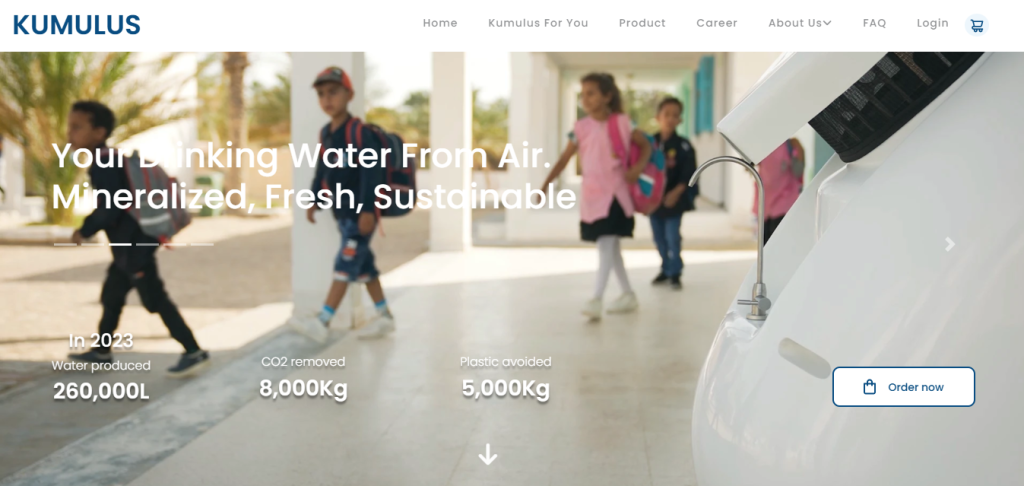Kumulus Water Raises $3.5M Seed Round to Expand Atmospheric Water Tech in MENA
July 12, 2025
byFenoms Startup Research

Kumulus Water, a cleantech startup focused on atmospheric water generation (AWG), has successfully raised $3.5 million in a seed funding round, fueling its mission to bring sustainable drinking water to arid and water-scarce regions. Co-founded by Iheb Triki, CFA and Mohamed Ali Abid, the company is gaining traction across the MENA region for its innovative, solar-powered water generation solutions.
Investors Backing a Region-First, Climate-Resilient Vision
The $3.5M seed round was led by a mix of regional and global climate-focused investors. The capital will help Kumulus ramp up manufacturing, expand into more North African markets, and invest in R&D to increase daily water yield. The startup has already seen early traction in Tunisia and Morocco, with dozens of units deployed across rural schools and off-grid villages.
Co-founder Iheb Triki shared that the funding will also be used to strengthen field operations and build data integrations that allow real-time monitoring of machine performance and maintenance. Positioned for a Booming Market
The atmospheric water generator (AWG) industry, once seen as experimental, is now projected to become a $9.2 billion global market by 2032, growing at a CAGR of 20.1%. Growth is driven by worsening droughts, rising energy costs, and government adaptation mandates. The Middle East and Africa region in particular is seeing surging demand for off-grid solutions due to climate volatility, energy insecurity, and crumbling water infrastructure.
Within this broader trend, Kumulus is carving out a unique position by pairing low-energy solar operation with compact design and field-readiness - making its machines ideal not just for governments and NGOs, but also for tourism, construction, disaster relief, and remote agriculture.
Revolutionizing Water Access With Solar-Powered Technology
At the heart of Kumulus Water’s impact is a compact device that literally pulls water from thin air. By harnessing humidity in the atmosphere and converting it into potable water, Kumulus machines serve as a lifeline for communities without access to clean water infrastructure. The technology is fully off-grid, solar-powered, and capable of producing 20 to 30 liters of drinking water per day - making it ideal for schools, refugee camps, remote villages, and small businesses.
The company was born from a shared vision between Iheb and Mohamed: to combat water scarcity with sustainable, decentralized tech that doesn’t rely on municipal systems or complex logistics.
Backing From Global Climate and Impact Investors
This seed round was led by a mix of local and international investors focused on cleantech, climate innovation, and social impact. While the full investor list was not disclosed, the funding will go toward scaling production, expanding commercial deployments in Tunisia, Morocco, and other MENA countries, and accelerating R&D to boost water output and energy efficiency.
"Our mission is simple but urgent: democratize access to drinking water," said Iheb Triki. “This funding gives us the ability to expand faster, serve more communities, and continue innovating in a region deeply impacted by climate change."
Why This Matters Now: Climate Crisis Meets Infrastructure Gaps
Water scarcity is one of the most pressing challenges in the MENA region. According to the World Resources Institute, 12 of the 17 most water-stressed countries globally are in this region. Climate change, coupled with population growth and underdeveloped infrastructure, has put enormous pressure on conventional water sources.
Kumulus is tapping into a megatrend: the rise of decentralized, off-grid water generation technologies that bypass aging and insufficient infrastructure.
Here’s the ultra value drop for founders:
In hardware startups, the myth is that innovation alone wins markets. But in frontier sectors like water, the real moat is in deployment strategy. Kumulus isn't just innovating tech - it’s mastering last-mile access in the hardest places. That’s where capital efficiency meets real-world defensibility.
If you're building for deep tech or climate impact, the insight is this: distribution isn't a phase - it's a product. Design for the edge from day one, and you'll build a company that not only scales - but sticks.
A Fast-Growing Market With Global Potential
The atmospheric water generator market is gaining momentum, projected to grow at a CAGR of over 20% through 2030, according to Market Research Future. Governments and NGOs are increasingly investing in alternative water technologies, especially in regions where groundwater is either depleted or contaminated.
Kumulus is positioning itself to become a regional leader in this niche, with potential expansion across Africa, the Middle East, and even into southern Europe. Its modular approach makes it easier to deploy in disaster zones, construction sites, eco-resorts, and schools - anywhere a clean, off-grid water source is needed.
Team Kumulus: From Vision to Execution
Iheb Triki brings deep financial expertise as a Chartered Financial Analyst (CFA) and an advocate for sustainable entrepreneurship in North Africa. His co-founder, Mohamed Ali Abid, complements the team with robust technical and operational experience, particularly in renewable energy systems.
Together, they’ve turned Kumulus from an idea into a promising startup with real-world deployments and strong early traction. Their journey reflects the growing ecosystem of MENA-born climate tech startups solving local challenges with global relevance.
What’s Next for Kumulus Water?
With fresh funding in hand, Kumulus plans to increase manufacturing capacity, expand into new markets, and strengthen its impact partnerships. The team is also exploring integration with smart monitoring systems for remote tracking and predictive maintenance - aa key feature for scalability in harsh environments.
In parallel, they aim to reduce the cost per liter and expand water output to serve larger populations, such as entire rural schools or clinics. These next steps will be crucial for securing larger public sector contracts and NGO partnerships in the coming years.









